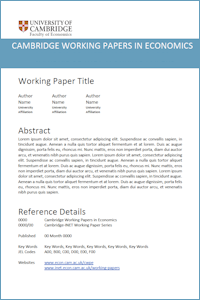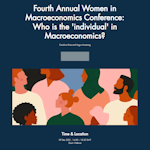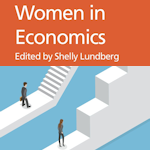
Meredith A. Crowley is a Reader in International Economics at the University of Cambridge, a Fellow of St. John’s College, and a Research Coordinator at Cambridge-INET. She is also a Research Fellow at the Centre for Economic Policy Research (CEPR - London) and a Research Leader for the publicly-funded UK in a Changing Europe think tank. Her research on international trade, multinational trade agreements, and trade policy has appeared in journals including the American Economic Review, the Canadian Journal of Economics, the European Journal of Political Economy, the Journal of Development Economics, the Journal of International Economics and World Trade Review. Her research and opinions on international trade policy frequently appear in prominent media outlets including The New York Times, The Washington Post, The Financial Times, The Economist, and the BBC.
Her faculty research seminar presented new work on “Markets and Markups: A New Empirical Framework and Evidence on Exporter from China,” a collaboration with Prof. Giancarlo Corsetti and Dr. Lu Han, both of Cambridge, and Prof. Huasheng Song of Zhejiang University.
This work examines firms that export goods to more than one destination and which account for the lion's share of cross-border trade. Serving multiple markets, these firms face demand conditions, market structures and policy regimes that differ across locations and are inherently time-varying. Furthermore, the intensity of competition among firms varies not only with local market structure, but also systematically across different types of globally-traded products---producers of highly differentiated manufactured goods hold more pricing power than producers of undifferentiated commodities. Crowley and her co-authors build an empirical framework suitable for analyzing the local or destination-specific markup and quantity adjustments of multi-destination exporters in firm and product-level administrative datasets.
On methodological grounds, the contribution is twofold. First, the research introduces an estimator of the markup elasticity to the exchange rate that exploits multiple destination-specific prices of individual products in order to net out changes in unobserved marginal costs---dubbed the Trade Pattern Sequential Fixed Effects (TPSFE) estimator. Second, the paper constructs a novel product classification of traded goods into categories of market power, or, equivalently, the degree of product differentiation. The core idea is a simple one: traded goods whose quantity is recorded in customs data by weight or volume are less differentiated than goods whose quantity is reported in countable units. Chinese customs data provide a unique opportunity to extend this simple idea into an exogenous classification system because the choice to record a product's quantity in units versus mass is predetermined by Chinese grammar and linguistics.
Applying this framework to exporters from China, they show that, on average, firms engage in significant pricing to market: the destination-specific markup elasticity to exchange rate movements is far from negligible, especially for highly differentiated goods (20%) as opposed to less differentiated goods (6%). They also show that differences in pricing to market across types of goods map into significant differences in the adjustment of relative export quantities sold around the world.
Markets and Markups: A New Empirical Framework and Evidence on Exporter from China
Corsetti, G., Crowley, M., Han, L. and Song, H.
Cambridge Working Papers in Economics
Revised December 2018







